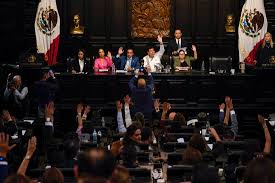By Aaior K. Comfort
Mexico has made history by becoming the first country to allow the popular election of judges at all levels, including the Supreme Court. The reform, which was approved with 86 votes in favor and 41 against in the Senate, marks a significant shift in judicial selection and has sparked widespread debate and protests.
Outgoing President Andrés Manuel López Obrador, a strong proponent of the reform, criticized the existing judicial system for serving the interests of the political and economic elite. The reform aims to democratize the judiciary by allowing citizens to vote for judges, a move Obrador claims will reduce the influence of powerful elites and enhance transparency.
The approval process was fraught with drama. Protesters stormed the Senate, chanting slogans and forcing lawmakers to relocate to a former Senate building to continue their debate. Senate leader Gerardo Fernández Noroña declared a recess during the demonstration, with protesters accusing lawmakers of dictatorship and defending the status quo.
Opponents of the reform, including court employees and law students, argue that the change could lead to increased susceptibility of judges to criminal influence, particularly in a country plagued by powerful drug cartels. Supreme Court Chief Justice Norma Piña warned that elected judges might be more vulnerable to bribery and intimidation, which could undermine judicial independence.
International observers, including UN Special Rapporteur Margaret Satterthwaite, have expressed concern over Mexico’s decision. Satterthwaite noted that while some countries have elected judges at the state or local level, Mexico’s approach is unique and could jeopardize judicial impartiality. The U.S. has also warned that the reforms might damage investor confidence and threaten the legal framework that supports trade relations between the two countries.
Human Rights Watch has urged Mexican lawmakers to reconsider the reforms, describing them as a potential threat to judicial independence and international human rights standards. Financial analysts have reported that investor concerns about the reforms have contributed to a significant decline in the value of the Mexican peso.
The reforms, set to affect around 1,600 judges, will come into play in 2025 or 2027, marking a bold and controversial step in Mexico’s judicial and political landscape.

